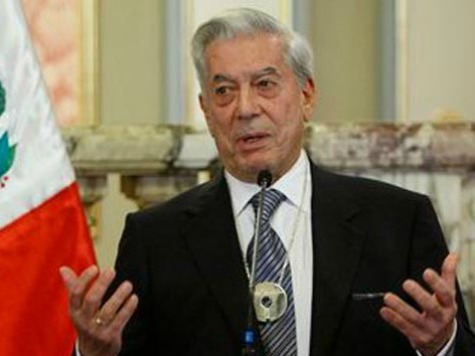Acclaimed Peruvian author and Nobel Literature Prize winner Mario Vargas Llosa is in Caracas, Venezuela, doing what he says his own government won’t do. “I feel the need to go and demonstrate,” he told Venezuelan newspaper El Universal early this month; this week, he made good on his promise to join the protesters.
Describing socialism as “a radical anachronism,” Vargas Llosa arrived in Venezuela this week to denounce the abuses of President Nicolás Maduro’s regime. “I don’t think socialism is as alive and present in the world of today,” he told reporters upon his arrival to Simón Bolívar Airport in Caracas. “Venezuela has insisted, in these last fifteen years, on distancing itself from modernity,” he argued, adding that Maduro’s election “proves that the people can make mistakes and regress.”
Vargas Llosa is in the country specifically to attend a summit with a Latin American NGO advocating for classical liberal thought. He has in the past attacked his own country’s president, Ollanta Humala, for not being proactive about combating the threat of “Bolivarian socialism” that the Venezuelan government presents. According to Vargas Llosa, socialism is a “plague that can spread throughout the region,” one that other Latin American leaders have a responsibility to counteract. While leftist Latin American leaders like Ecuador’s Rafael Correa and Argentina’s Cristina Fernández have been vocal in their support for Maduro, moderately left-leaning Latin American leaders like Humala have remained mum. Colombian President Juan Manuel Santos, one of the few remaining right-leaning leaders in the continent, has expressed “pain” at the human rights abuses in his neighboring country.
While Vargas Llosa is in Venezuela for political reasons, he has found himself at the center of the news cycle for another reason: the death of Fidel Castro’s buddy Gabriel García Márquez, with whom Vargas Llosa held a life-long rivalry. Both Vargas Llosa and García Márquez, also a writer, vowed never to reveal the reason behind a feud that lasted decades. Vargas Llosa told the press this week, according to Reuters, that he, too, would take the secret to his grave.
The plight of the Venezuelan people under the oppressive yoke of the Maduro regime has captured headlines internationally since the arrest of opposition leader Leopoldo López for organizing an assembly calling for government reforms. Maduro followed López’s arrest with the arrests of several opposition party mayors and a sweep within the military, after Maduro claimed more than 30 soldiers were involved in an extensive conspiracy to stage a coup. Videos posted on YouTube and images to Twitter in the months following López’s arrest in February reveal the breathtaking scope of abuse the Venezuelan National Guard has committed: disfiguring, beating, and torturing protesters, particularly in the outer provinces of the country, which border Colombia.
Below, watch Vargas Llosa’s comments (in Spanish) upon arriving in Caracas this week:

COMMENTS
Please let us know if you're having issues with commenting.